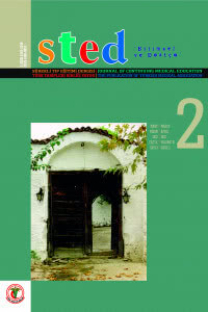Zor hasta ve hasta-hekim ilişkisinde yaşanan güçlükler
Hasta-hekim ilişkisinde hekimlerin karşılaştıkları sorunlardan birisi de zor hastalardır ve hastaların yaklaşık üçte biri hekimler tarafından zor hasta olarak algılanmaktadır. Klinik uygulamalarda hekimlerin bu hastalar ile daha fazla sorun yaşadığı görülmektedir. Bazı hekimler bu hastalar ile iyi bir hasta-hekim ilişkisi kuramamakta ve bazılarını reddetmektedir. Zor hastalar ile baş etme konusunda hekimlerin bilgi ve beceri eksikleri bulunmaktadır. Öneminin biliniyor olmasına karşın, birçok mezuniyet öncesi ve mezuniyet sonrası tıp eğitimi ve öğretimi programları zor hastalarla nasıl baş edecekleri konusunda hekimleri uygun ve yeterli biçimde eğitmemektedir. Hasta-hekim ilişkisini yönlendirme konusunda hekimin profesyonel bir sorumluluğu vardır. Bu nedenle, hekimlerin bu hastalar ile neden baş edemediği ve zor hastalar ile iletişim becerilerini geliştirme konuları araştırılmayı bekleyen konulardır. Zor hasta deyimi hastalar ile yaşanan zorluklardan tek başına hastanın sorumlu olduğunu düşündürüyor olmakla birlikte, sorunun doğası geniştir. Hekimler tarafından zor olarak nitelenen etkileşimde hastanın, hekimin ve sağlık sisteminin sorumlulukları olabilmektedir.
Difficult patients and the difficulties in patient-physician relationships
One of the problems that physicians face in patient-physician relationship is difficult patients and up to one third of patients are perceived as difficult patients by physicians. In clinical practice, it has been observed that physicians experience more problems with such patients. Some physicians are unable to develop a good patient-physician relationship with them and prefer to end the communication. Physicians have knowledge and skill gaps in their ability to manage difficult encounters. Although the importance of this problem is well acknowledged, many undergraduate and postgraduate medical education and training programmes do not train physicians adequately to deal with difficult patients. Physicians have a professional responsibility to manage the patient-physician relationship and therefore, there is a need to explain why physicians are not able to deal with these patients and to develop physician skills for handling difficult patient encounters. Although the phrase difficult patient suggests that the patient alone is responsible for a difficult encounter, the nature of the problem is widespread. In interactions labelled as difficult by physicians, the problem may stem from the patient, the physician, or the health care system.
___
- 1. Haas LJ, Leiser JP, Magill MK, Sanyer ON. Management of the difficult patient. Am Fam Physician 2005; 72: 20638.
- 2. Hahn SR, Kroenke K, Spitzer RL, Brody D, Williams JBW, Linzer M, deGruy FV. The difficult patient: Prevalence, psychopathology, and functional impairment. J Gen Intern Med 1996; 11: 1-8.
- 3. Mayou R, Sharpe R. Patients whom doctors find difficult to help / an important and neglected problem. Psychosomatics 1995; 36(4): 3235.
- 4. Paterniti DA, Fancher TL, Cipri CS, Timmermans S, Heritage J, Kravitz RL. Getting to no / Strategies primary care physicians use to deny patient requests. Arch Intern Med 2010; 170(4): 381-8.
- 5. Akgün-Çıtak E, Avcı S, Basmacı Ö, Durukan İ. Bir üniversite hastanesinde hemşirelerin zor hasta olarak tanımladıkları hastalarla iletişim davranışlarının incelenmesi. Hemşirelikte Araştırma Geliştirme Dergisi 2011; 13(1): 35-44.
- 6. Breen KJ, Greenberg PB. Difficult physicianpatient encounters. Internal Medicine Journal 2010; 40: 682-8.
- 7. Macdonald M. Seeing the cage: stigma and its potential to inform the concept of the difficult patient. Clin Nurse Spec. 2003;17(6):305
- 8. Oliver D. Teaching medical learners to appreciate difficult patients. Canadian Family Physician 2011; 57: 506-8.
- 9. Stacey CL, Henderson S, MacArthur KR, Dohan D. Demanding patient or demanding encounter?: A case study of a cancer clinic. Social Sciences & Medicine 2009; 69: 729-37.
- 10. Serour M, Othman HA, Khalifah GA. Difficult patients or difficult doctors: an analysis of problematic consultations. Eur J Gen Med 2009; 6(2): 87-93.
- 11. Lechky O. There are easy ways to deal with difficult patients, MDs say. Can Med Assoc J 1992; 146(10): 17935.
- 12. Gabbard GO. Basic principles of dynamic psychiatry. Psychodynamic Psychiatry In Clinical Practice. 3rd ed. Washington: American Psychiatric Press. 2000. p.3-25
- 13. Schafer S, Nowlis DP. Personality disorders among difficult patients. Arch Fam Med 1998; 7: 1269.
- 14. Kalender A, Uludağ A. Sağlık hizmetlerinin yürütülmesinde doktor-hasta ilişkisinin rolü. Amme İdaresi Dergisi 2004; 37(4): 117-32.
- 15. Goldberg PE. The physician-patient relationship / Three psychodynamic concepts that can be applied to primary care. Arch Fam Med 2000; 9: 1164-8.
- 16. Miksanek T. On caring for difficult patients. Health Affairs 2008; 27(5): 1422-8.
- ISSN: 1300-0853
- Yayın Aralığı: Yılda 6 Sayı
- Başlangıç: 1992
- Yayıncı: TÜRK TABİPLERİ BİRLİĞİ
Sayıdaki Diğer Makaleler
Zor hasta ve hasta-hekim ilişkisinde yaşanan güçlükler
Afrika'da bir mülteci kampındaki sağlık hizmetlerine halk sağlığı yaklaşımı
Yunus Emre BULUT, RIZA ÇITIL, Zeynel KALLİ, Mahmut COŞKUN
Çocuk sağlığını etkileyen kronik hastalıklar
0-6 Yaş çocuklarda ishal olmayı etkileyen etmenler ve annelerin ishal konusundaki bilgi düzeyleri
SEVAL CAMBAZ ULAŞ, Ç. Aynur ÇETİNKAYA, DİLEK ÖZMEN, KIVAN ÇEVİK
Ankara'da bazı semt duraklarında çalışan taksi şoförlerinin sağlıklı/riskli yaşam davranışları
Emir KESKİN TUĞRUL, Funda KÜTÜK, Büşra Betül ÖZMEN, Elif ÖZYÖRÜK, Yelda YAZIR, DİLEK ASLAN
Gestasyonel diyabetli kadınlarda sağlık durumu yönetiminin değerlendirilmesi
